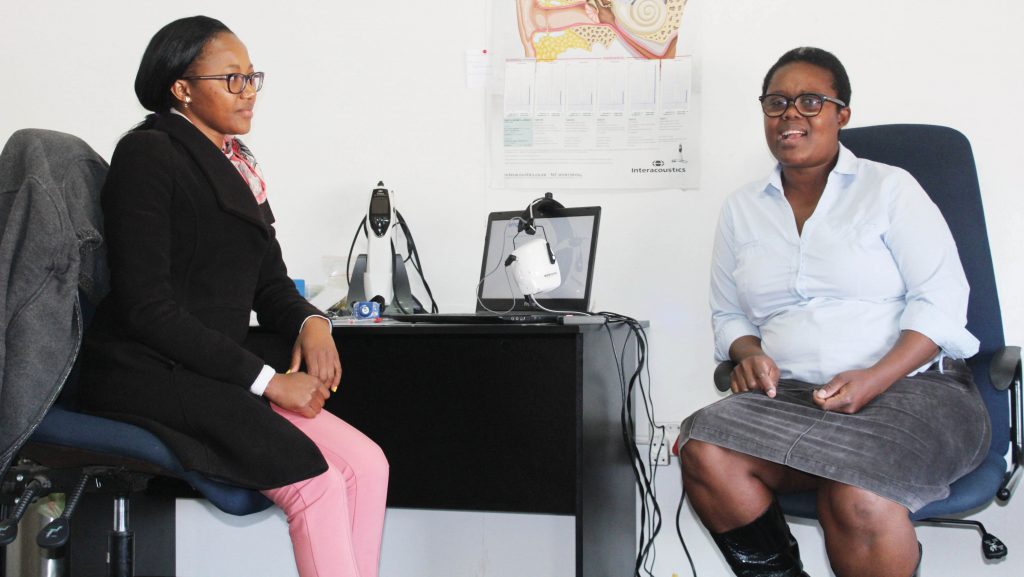
Mamohlakola Letuka and Bereng Mpaki
FOR Teboho Frantsi and Puleng Jonkomane, venturing into a sector off the beaten business path was not an obstacle but a challenge to fulfil their dreams.
The two qualified audiologists decided to establish an audiology clinic in Lesotho prompted by a passion to assist people with hearing-related challenges, which had the effect of affecting the quality of their lives.
To achieve their dream, Ms Frantsi (37) and Ms Jonkomane (29) needed to raise over M1 million.
“Ideally, we needed over M1 million to acquire all the equipment needed to launch our business. But, suffice to say we did not have such an amount,” Ms Frantsi told the Business Journal in an interview this past week.
Having cobbled together all the resources they could muster, the duo managed to buy the necessary equipment and in 2015 opened the doors to Lesotho’s first audiology specialist facility called HearSense -Hearing, Speech and Balance Clinic.
It is based in Borokhoaneng along the Main South One road just outside the central business district of Maseru.
The duo later got a shot in the arm when they won M100 000 from an entrepreneurship competition held by Maluti Mountain Brewery (MMB) in 2016. They used the money to acquire more equipment.
Dubbed Project Kickstart, the entrepreneurship competition is MMB’s flagship corporate social investment programme that trains and finances budding entrepreneurs selected through an application process by an independent team of business experts.
The clinic also received an additional M20 000 from Project Kickstart in 2017 for being the most promising enterprise among the businesses that were funded in the 2016 edition.
Ms Frantsi said the clinic was established to bridge the service delivery vacuum for patients with hearing problems at public health centres.
Previously, she said, most patients had no choice but to get treatment outside the country.
Ms Frantsi said the clinic provided a wide range of services such as speech therapy, hearing assessment, aural rehabilitation, tinnitus management, ototoxicity monitoring, neonatal hearing screening, custom ear and swimming plugs, school-based hearing screening, ear wax and foreign body management, electrophysiological hearing assessment, hearing aids and assistive listening devices, dizziness and balance assessment as well as rehabilitation, central auditory processing assessment and rehabilitation and hearing conservation programs especially for the production industry.
As a former audiologist for Tšepong Hospitals, Ms Frantsi indicated that resolving hearing problems was normally overlooked by general medical practitioners as they were tricky to diagnose and caused by many factors.
“You will find that some of the public health centres are unable to trace many patients’ disorders back to their hearing system, and therefore fail to solve their problems,” she said.
“For instance, dizziness in patients is often presumed to be associated with conditions such as high blood pressure or diabetes. Yet it could be a sign of problems in the hearing system.”
Ms Frantsi explained that one of the reasons she decided to establish a private clinic was because in her job was at Tšepong she was restricted to dealing with hearing challenges only, excluding balance or speech production.
“I wanted to make full use of my skills to help more people having observed that they were were seldom referred to any hearing specialists by the general medical practitioners.
“Because of the subpar medical services, many people are living with hearing disorders which they believe are incurable. Yet, the reality is that they can be prevented, hence the need for a stronger primary health care system that includes specialists in audiology.”
Most hearing problems, she said, could be cured if spotted at the early stages of development.
“That is why the dissemination of information on how to take care of ears including watching out for high levels of noise that can damage hearing is so critical.”
Ms Frantsi also pointed out that they were determined to carry on with the business despite the many challenges they faced. One of such problems is the fact that public health centres were not referring patients to the clinic, even though the former did not have the expertise to deal with hearing problems.
“As a result, we don’t get as many patients as we would want to treat. For those patients who find their way to the clinic, they often cannot afford the medical costs.
“But, we cannot turn away patients when they have come seeking help. So, oftentimes we find ourselves having to accept whatever little money the patients can afford.
“If we were motivated by finances, this clinic wouldn’t be here today. Consequently, our standard of living has gone down and we are beset with many financial challenges.”
Chipping into the conversation, Ms Jonkomane said they were hoping for a closer working relationship with the Ministry of Health which regulates their sector.
“We would really be happy if there was more recognition from the government,” she said.
“It is our belief that if we were to join forces with the government in raising awareness about hearing health, it would contribute to the wellbeing of individuals and society as a whole.”
The pair have started awareness campaigns and workshops that educate people on how to take care of ears and how to stay healthy, in environments with high noise levels.
Ms Jonkomane said one of the issues leading to hearing problems was lack of adherence to laws regulating noise levels in the workplace.
She said noise levels in workplaces such as construction sites needed to be closely monitored so that appropriate measures could be taken to conserve the hearing of employees.
“Constructors have to work with people like us before proceeding to buy ear plugs for their workers because there are specific ear plugs for specific noise levels. Work sites need to be assessed first before operations commence,” Ms Jonkomane said.
“Most people come to our clinic as the last resort, and by then it is too late to treat them. The hearing loss would have become permanent, and adjusting to hearing aids is the only solution,” chimed in Ms Frantsi.
“People with hearing loss cannot fully enjoy life because as humans we do not live in silence. There are noises which are part of our daily lives, and not being able to hear things can either put the patient’s life at risk of either an accident or crime because they can’t hear what is happening in their environment.”
The duo aspire to establish a rehabilitation centre catering for many people with various hearing impairments.



